Over the last decade, but particularly in the last five years, BU has matured into a university with a strong research track record with some of the most talented researchers anywhere in the world. It is a fantastic success story and one to be justifiably proud. Take a look at the graph which shows the growth in our published output as depicted by Scopus data; it truly something! Our output has grown at a rate of over 13% compared to 3.7% for the UK as a whole.
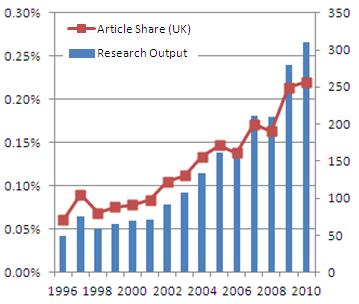 RAE2008 was a milestone in this journey – the fourth most improved University was the well-deserved headline! There is much to shout about but we also have to think carefully about how we can continue this trajectory building on this foundation.
RAE2008 was a milestone in this journey – the fourth most improved University was the well-deserved headline! There is much to shout about but we also have to think carefully about how we can continue this trajectory building on this foundation.
To do this we will need to find more income. Our research income per academic FTE remains modest at around £6.5k compared to a sector average of £50k per FTE. To grow our research base further we need to up our game. You may ask why? Well to make another step change and ensure that we are not just left in the stocks as a teaching-only university as the sector shifts in the coming years we need to grow our learning community of research students, research assistants and post-doctoral fellows which are the lifeblood of a successful research active university. To do this we will need to attract much more external research income. It is not, however, just a question of bidding more, but critically of increasing the quality of our bids and thereby our success rates.
There are many reasons why a shift to a research culture driven by societal need is important, not least of which is to give something back as a public institution to society, but it is also important to ensure our ability to bid more successfully for funds in the future. Let me use my own career as an illustration. My first passion is glacial geology and I spent much of the 1990s studying the esoteric discipline of sediment transport in Arctic glaciers. It was a fantastic period in my life in which I was perpetually scraping together funds for my next field trip and never more at home than on some frozen glacier. Money was not easy to come by because in truth there was little funding available for such work, to be blunt it has little or no societal relevance. It was not until I joined BU in 2002 that I started to reinvent my research direction working for the first time in the field of contaminated land as an environmental geologist and starting to work first in Central America and then in Africa on aspects of human evolution. During this second part of my career my success rate with Research Councils increased three-fold, as did the total amount of research income I generated. In essence I shifted from a field with little societal relevance to one with huge value. My passion for research remains but is just directed slightly differently! At the heart of this story is the fact that I was able to transfer my skills as sedimentologist – someone who studies dirt – from one discipline to another.
Within BU we have a lot of active and talented researchers some of whom are working in fields of societal importance but some whom are not, preferring to pursue their own, often narrow, research agenda. By shifting to a more societal focus for the majority of our research our ability to generate income and achieve societal impact is likely to be much greater and this is a shift that we need to make together over the next year or so. A shift which is something that is essential if we are to make BU2018 a reality.
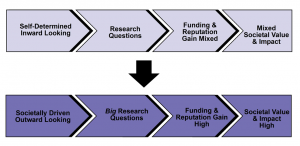
During the last year BU has been through a process of defining societal research themes and it is worth refreshing ourselves about this journey. The initial candidate set of themes was generated from a trawl of all the priority funding areas for all major research funding bodies (Research Councils, European Commission, major charities, etc). This list was debated and refined by the BU Professoriate and subject to an all staff survey, in which candidate themes where put to the public vote. The remaining ten themes were scoped out and defined and then whittled to eight earlier this year via debate on this blog. These are the research themes on which BU has chosen to focus its societal research effort. But crucially they are still up for debate, evolution and further discussion. To this end I recently invited all staff to an event on the 14 December 2011 at which the research themes will be scoped further and networks of researchers created. If you have not signed up yet I would encourage you to do so!
To register your place at the Fusion Event on 14 December complete this form:
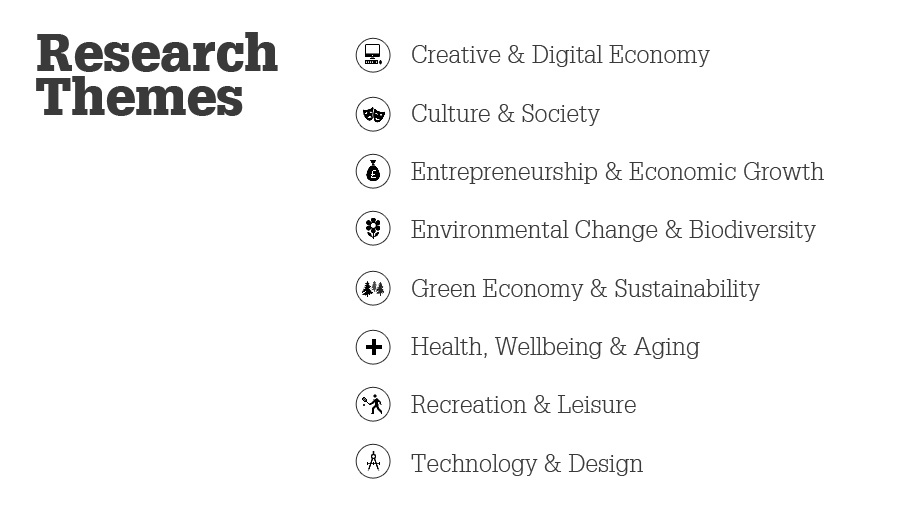
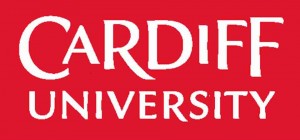 A project based at Cardiff University is seeking partners for the FP7 Security Call SEC-2012.4.4-2 ‘Means of decontamination of large groups, urban/wide areas and large, complex and/or sensitive object’.
A project based at Cardiff University is seeking partners for the FP7 Security Call SEC-2012.4.4-2 ‘Means of decontamination of large groups, urban/wide areas and large, complex and/or sensitive object’.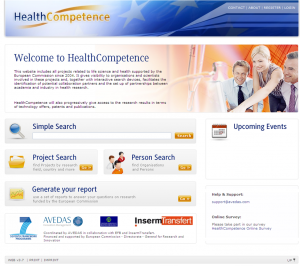
 Welcome to RCUK Demand Management week on the blog! Today’s focus is on the Arts and Humanities Research Council (
Welcome to RCUK Demand Management week on the blog! Today’s focus is on the Arts and Humanities Research Council ( Watch this excellent short video from BU’s Bryce Dyer (School of Design, Engineering and Computing) who is informing the 2012 Paralympics committee on the performance of lower limb prosthetics.
Watch this excellent short video from BU’s Bryce Dyer (School of Design, Engineering and Computing) who is informing the 2012 Paralympics committee on the performance of lower limb prosthetics.
 Welcome to RCUK Demand Management week on the blog! Today’s focus is on the Natural Environment Research Council (
Welcome to RCUK Demand Management week on the blog! Today’s focus is on the Natural Environment Research Council ( Good luck to Stuart Allan (MS) who has submitted quite a large bid to the BBC to undertake some research in the media coverage of conflict, Einar Thorsen (MS) for a small bid to the Association of Journalism Education to look at strategies for the use of news websites in journalism education, Edwin van Teijlingen (HSC) for submitting a capacity building partnership bid to THET, Eileen Wilkes (ApSci) for submitting a proposal to the British Academy small grants scheme to continue her research at Mount Folly, Ian Jones, Emma Kavanagh and Lorraine Brown (ST) for a joint bid to the British Academy, and to Lorraine Brown for a second bid to the British Academy. Good luck also to Janet Dickinson (ST), Heather Hartwell (ST/HSC) and Fabian Homberg (BS) each of whom has submitted a bid to the ESRC seminar series, Rosie Read (HSC) who has submitted two fellowship applications to research volunteering in the Czech Republic, and to Steve Calver and the MRG team (ST) who have submitted three bids to Dorset County Council
Good luck to Stuart Allan (MS) who has submitted quite a large bid to the BBC to undertake some research in the media coverage of conflict, Einar Thorsen (MS) for a small bid to the Association of Journalism Education to look at strategies for the use of news websites in journalism education, Edwin van Teijlingen (HSC) for submitting a capacity building partnership bid to THET, Eileen Wilkes (ApSci) for submitting a proposal to the British Academy small grants scheme to continue her research at Mount Folly, Ian Jones, Emma Kavanagh and Lorraine Brown (ST) for a joint bid to the British Academy, and to Lorraine Brown for a second bid to the British Academy. Good luck also to Janet Dickinson (ST), Heather Hartwell (ST/HSC) and Fabian Homberg (BS) each of whom has submitted a bid to the ESRC seminar series, Rosie Read (HSC) who has submitted two fellowship applications to research volunteering in the Czech Republic, and to Steve Calver and the MRG team (ST) who have submitted three bids to Dorset County Council

 Welcome to RCUK Demand Management week on the blog! Today’s focus is on the Economic and Social Research Council (
Welcome to RCUK Demand Management week on the blog! Today’s focus is on the Economic and Social Research Council (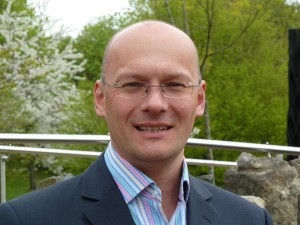 Watch this excellent short video from BU’s
Watch this excellent short video from BU’s 
















 Bournemouth University psychologists publish new book
Bournemouth University psychologists publish new book Connecting Research with Practice: FoodMAPP Secondment in Austria and France
Connecting Research with Practice: FoodMAPP Secondment in Austria and France Health promotion paper read 8,000 times
Health promotion paper read 8,000 times The Beautiful Work Challenge: On Birth
The Beautiful Work Challenge: On Birth Free event on Solutions to Inequalities in Dementia Diagnosis and Care
Free event on Solutions to Inequalities in Dementia Diagnosis and Care MSCA Postdoctoral Fellowships 2025 Call
MSCA Postdoctoral Fellowships 2025 Call ERC Advanced Grant 2025 Webinar
ERC Advanced Grant 2025 Webinar Horizon Europe Work Programme 2025 Published
Horizon Europe Work Programme 2025 Published Horizon Europe 2025 Work Programme pre-Published
Horizon Europe 2025 Work Programme pre-Published Update on UKRO services
Update on UKRO services European research project exploring use of ‘virtual twins’ to better manage metabolic associated fatty liver disease
European research project exploring use of ‘virtual twins’ to better manage metabolic associated fatty liver disease